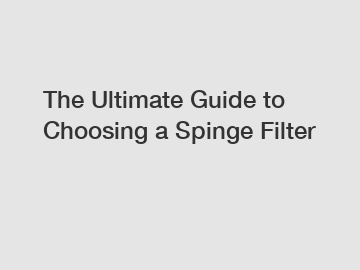The Ultimate Guide to Choosing a Spinge Filter
The Ultimate Guide to Choosing a Sponge Filter.
When it comes to maintaining a healthy and clean aquarium, one of the most important factors to consider is the filtration system. Among the various types of filters available in the market, a sponge filter is an excellent option for both beginner and experienced aquarists. Sponge filters are highly efficient at removing waste and improving the water quality in your aquarium. In this guide, we will walk you through the process of selecting the perfect sponge filter for your needs.
Understanding Sponge Filters.

Sponge filters are mechanical and biological filters that use a sponge as the main filtration material. The sponge acts as a mechanical barrier, trapping debris and waste particles in the water. Additionally, the sponge provides a large surface area for beneficial bacteria to colonize and break down harmful substances such as ammonia and nitrites.
Benefits of Sponge Filters.
Sponge filters offer a range of advantages that make them a popular choice among aquarium enthusiasts. Firstly, they are easy to install and maintain. Unlike other types of filters that require complex setups, sponge filters can be simply placed inside the tank and connected to an air pump. Cleaning sponge filters is also a breeze, as the sponge can be easily rinsed and reused.
Secondly, sponge filters are ideal for betta and shrimp tanks. The gentle water flow created by the sponge filter prevents these delicate creatures from being sucked into the filter and eliminates the risk of injury or death.
Choosing the Right Sponge Filter.
1. Tank Size:
- Consider the size of your aquarium when selecting a sponge filter. Larger tanks may require multiple filters or a more powerful sponge filter to ensure proper filtration.
2. Filtration Capacity:
- Check the specifications provided by the manufacturer to determine the filtration capacity of the sponge filter. This will give you an idea of the volume of water that a particular filter can handle.
3. Air Pump Compatibility:
- Sponge filters require an air pump to function properly. Ensure that the sponge filter you choose is compatible with the air pump you have or plan to purchase.
4. Sponge Pore Size:
- Different sponge filters have varying pore sizes. Finer pore sizes are more suitable for aquariums with small fish or fry, as they prevent them from being sucked into the filter.
5. Bioload:
- Consider the bioload of your aquarium, which refers to the number and size of fish or organisms in the tank. Higher bioloads may require a more powerful sponge filter to handle the increased waste production.
Closing Thoughts.
Ultimately, the selection of a sponge filter depends on the specific needs of your aquarium. By considering factors such as tank size, filtration capacity, air pump compatibility, sponge pore size, and bioload, you can make an informed decision. Remember, a well-maintained sponge filter will help keep your aquarium water clean and ensure the health and longevity of your aquatic pets.
If you have any further questions or need assistance in choosing the right sponge filter for your aquarium, please do not hesitate to contact us. We are here to help you create the perfect environment for your underwater friends.
Keywords: contact us.
If you are looking for more details, kindly visit filler cooling tower liang chi, eliminator cooling tower, frp vs grp.
48
0
0

Comments
All Comments (0)